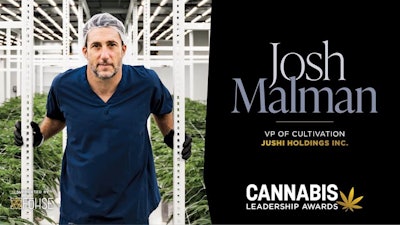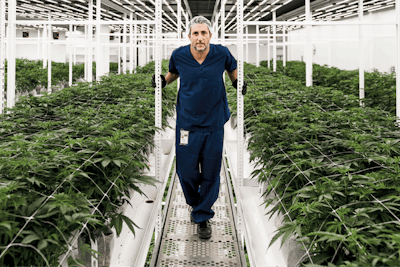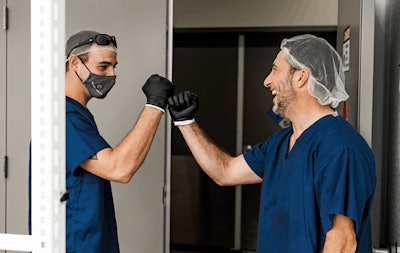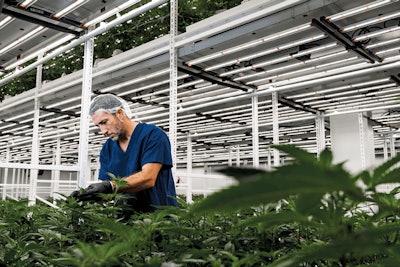

It’s mid-July, and Josh Malman’s flight has just touched down on a runway far from home again. He’s traveled eastward to work out of Jushi’s facility in Scranton, Pa., operated by Jushi’s wholly-owned subsidiary Pennsylvania Medical Solutions, for a few days. The trip’s objective: Help onboard the site’s new director of cultivation, Matt Bencivenga, who was hired after cutting his teeth in Colorado.
This is what Malman spends a lot of his time doing: Moving among three of Jushi’s cultivation facilities (in Scranton; Manassas, Va.; and North Las Vegas, Nev.) and helping a quickly growing team carve an innovative path through the licensed cannabis industry. He connects with the staff on the ground. He gets up-close with the plants. He makes sure the business plan is in motion, gleaning helpful insights from the people he leads.
Malman, as the company’s vice president of cultivation, is into his second decade in the cannabis industry. He’s learned a lot, of course, and there’s still plenty of road to travel.
“What I really have appreciated over the last year is that we’re building a knowledge-sharing group within our own company,” he says. “We have weekly cultivation calls with leadership from all the facilities, and we’re using those for problem-solving sessions. We’re using those to help harmonize and globalize our SOPs (standard operating procedures) across facilities. And while we’re all operating in three very separate and unique types of facilities, cultivation, in my opinion, can be somewhat globalized, and the processes themselves can be similar.”

Malman came to Jushi Holdings Inc. as part of an acquisition that closed in 2019, when the company brought on senior-level management from The Clinic, a vertically integrated cannabis company in Colorado. It was around this time that Jushi began to delve more deeply into the cultivation segment of the industry. Malman’s expertise is a big part of that dive, and of Jushi’s growth plans.
“… as much as he needed me there, he also knew that I wasn’t going to be able to move up any more in my position. He gave me the opportunity to go out, and that’s always resonated pretty hard with me.” Aaron Vickles,National Cultivation Director, Jushi Holdings Inc.
The Scranton facility’s staff has doubled within the past year, and they’re now in the midst of an expansion project. Malman has been at the heart of that project, providing his perspectives on room buildouts and technological functions across the building. The company purchased a retrofitted warehouse from Vireo Health in the summer of 2020, and now the team is in the process of closing grow rooms here and adding grow rooms there, altering the building to suit Jushi’s needs. By the end of this year, Jushi will have added another 38,000 square feet of cultivation space to their original purchase.
That includes, most notably, two stories of double- or triple-tier cultivation rooms with mobile racking—all under gleaming LEDs. “And, really, that’s our design going forward for all of our facilities,” Malman says.
For him and the Jushi crew, the Scranton expansion is an exciting opportunity to navigate the past, present and future all at once.
RELATED: Best Cannabis Companies 2020: Jushi Creates a Passionate, Purpose-Driven Workplace
This is another area in which Malman spends a lot of his time: Keeping one eye on the future, such as planning strategic market moves and researching innovative horticulture technology, while making sure that the day-to-day production grind is in good hands.

Through it all, Malman makes sure to get out from behind the desk and work alongside the cultivation staff—whether that means joining a harvest team in pulling down a flower room or scouting the plants during veg. To him, the sense of leadership that’s guided his career is one of activity and intent. He makes it a point to walk the walk.
From Scranton, only a few days after he landed, Malman will travel to the ongoing Jushi buildout in Virginia, where the company holds one of four licenses in a tightly regulated medical cannabis market that’s awaiting the implementation of a newly greenlit adult-use program.
By end of the week, Malman will be back home in Denver, where he lives with his wife, Erin, and their two children. Denver has been home since 2010, when the call of the legal cannabis business first brought him to the front lines of the emerging industry.
The Start of a Horticulture Journey
Plants were always part of Malman’s plan, at least dating back to his studies at the University of Wisconsin, where he was a student seeking a path. A professor suggested Intro to Horticulture. It was something different, something vaguely exotic. Meanwhile, Malman was cultivating his own interest in the cannabis plant.
College courses brought him to Israel for a study-abroad trip built around international horticulture—specifically, irrigation practices. After school, Malman set about his goal of growing millions of plants in a large-scale ag setting. He wanted to see the fruits of his labors before him, and he wanted to walk among them. That was his vision. He worked at Nurserymen’s Exchange in California, where he picked up valuable lessons within the rows of greenhouse-grown ornamentals.
There, in Half Moon Bay, Calif., Malman learned from hort pros who’d been in the business for decades. He saw firsthand how they navigated the plants with a sense of feel informed by years of dedication to the craft. They weren’t bound strictly to regimens and metrics; rather, Malman’s leaders showed him how a good educational background is only a foundation for the work itself. Once you know what needs to be done, it’s up to you to do it.
“When I started my production and horticultural career, [I was focused on] learning how to see and feel and understand the plants from a real, sort of unscientific way—just understanding how to operate the facilities,” he says.
Malman’s work in California allowed him to achieve his goal of working in a sprawling agricultural setting, and yet there was more to do. As it has for many others, the cannabis plant beckoned.
“I’m not going to sit over your shoulder and micromanage your every single decision-making around how much water a plant gets day one versus day two. That’s the touch and feel that you only really get from being next to the plants day in and day out.” Josh Malman, VP of Cultivation, Jushi Holdings Inc.
Malman learned that a few friends from high school were in the early stages of running a business in Colorado. It was called The Clinic, and Max Cohen and Andrew Keller were interested in bringing Malman out to the business. Cohen met Malman in California in 2010, and the two talked about what this might look like. The Clinic was still a small business, essentially a mom-and-pop shop feeling its way through the Colorado medical cannabis market.
“When I saw the opportunity, it was a happy marriage of what I wanted to do in my personal life with what I wanted to do in my professional life,” Malman says.
New Opportunities
It was at The Clinic where Aaron Vickles met Malman. He was a young trimmer at the time, working his way through a college education rooted in plant biology and chemistry. Cannabis aligned with his own interests and gave him a real-world outlet for his studies.
He started eyeing new opportunities within the business.
“At that time, cultivation was the most prized department to work in,” Vickles says. “I had talked to Josh and asked, ‘Do you have anything I can do in cultivation that would help out? Anything I can do?’ And he said, ‘Yeah, I do, but you’re going to be the grunt. You’re going to be harvesting, you’re going to be busting pots, you’re going to be spraying. If you want this, that’s what you’re going to do.’ And I was like, ‘I will take it!’ Once I came into the cultivation department, he took me under his wing and taught me everything.”
This was in the early years, soon after Malman took the job in Denver. For both men, it was a fruitful professional dynamic. Malman honed his managerial style, while Vickles picked up a valuable education—and a friend—that would set the stage for the rest of his career to date.
“He took me and molded me from the ground up,” Vickles says. “I worked my way up from the grunt labor, which takes time. You’ve got to get your hands and mind around the entire garden process. And then I became an assistant grower, then a grower, and I kept working my way up to an assistant manager.” Before long, Vickles took on a management role himself, ultimately overseeing The Clinic’s suite of indoor cultivation facilities.
This sort of progression doesn’t happen overnight, of course, but it’s helped along by the keen mentorship of someone like Malman.
Later on, Malman thought so highly of his protégée that he actually set up Vickles with an opportunity to work as a project manager with a company in northern California—sending his talented employee away from The Clinic.
“I thought, what better way to take what I’ve learned so far and showcase it on the next level—especially to go to northern California, where the best of the best has always been grown?” Vickles says. “So, Josh actually offered me the opportunity to go out there, and I asked him, ‘Are you sure you want to lose me? And he was like, ‘Absolutely not, but I would never hold you back from an opportunity to excel in the industry.’ That one’s always hit home with me, because as much as he needed me there, he also knew that I wasn’t going to be able to move up any more in my position. He gave me the opportunity to go out, and that’s always resonated pretty hard with me.”
It’s a parable for how leaders watch their charges flourish in the world. It’s a fool’s errand to try and keep someone else’s talents for yourself, and Vickles says that the opportunity to move to California provided him a greater purview for his own career.
By 2019, however, the U.S. cannabis industry had shifted dramatically. Colorado was no longer necessarily the center of the cannabis universe, and in some ways the market had reached a plateau in Malman’s eyes. Nearly a decade of work—growing plants, working with regulators, expanding the business—had given him a craving for something more. The industry was maturing rapidly and taking on new forms in places like Illinois, Virginia, and Oklahoma. Even California’s cannabis industry had evolved significantly since Malman’s pre-Prop. 64 days in Half Moon Bay. The opportunities seemed farther-reaching than ever before.
Then Jushi came calling.
Jushi’s Call
In the summer of 2019, Jushi acquired portions of The Clinic’s intellectual property portfolio and management team—including Malman. It seemed like a chance for him to hone his interests in horticulture technology and large-scale disruptions. It was a chance to think beyond the industry itself, even. He had visions of vertical farming, data-backed decision-making and a more national frame of reference for the dawning of the new decade in cannabis.
Then, as Malman was getting settled at Jushi (from his home office in Denver, where he and his family elected to stay), an old friend returned to the fold.
After spending time in northern California, Vickles ended up landing a job at Jushi’s Pennsylvania facility. He’s now the company’s national cultivation director—helping to translate his mentor’s teachings into action for a new crop of cannabis industry entrants.
“I’ve piggybacked off Josh’s leadership style,” he says. “Learning from him the whole time, I’ve taken what he’s taught me and put that into my own management and leadership style. What that [means] is never being afraid to get shoulder-to-shoulder with your guys, instead of by dictating, ‘Here are your jobs for the week, and make sure they get done on this timeframe,’ or, ‘Here’s an SOP. Read it now, do the job.’ Nothing like that. You’ve got to suit up and get in the trenches with your guys, work side-by-side with them, teaching them the hows and the whys of … doing the job. It’s more like having your team feel like they are part of a team, that everyone there is part of this growing process.”
More than ever before, Malman is surrounded by a team that’s open to innovation and creativity. The possibilities seem to be limitless, and it’s only with a helpful, healthy leadership sense that a sprawling multi-state company is going to get to where it’s headed.
Malman is hoping to do just that at Jushi’s cultivation and manufacturing facility in Virginia. The construction plans for the Manassas facility were inherited from an acquisition of a dry storage facility (replete with inconvenient column lines running through what would become the company’s grow rooms), but what the facility lacked in turnkey cannabis capabilities, it more than made up for in sheer possibilities and scale. Jushi is now in full-on construction mode in Manassas, converting the first-floor rooms to double-rack LED grow rooms and setting up a processing space on the building’s second story.
The way that Jushi operates, its cultivation and manufacturing departments are seen as two separate entities, in a way. Even when these processes occupy the same facility, the site staff work as two teams.

And yet, one hand washes the other. Together, the teams are realizing efficiencies in whichever market we’re talking about. In Virginia, Malman says that extra scrutiny on that hand-off point—when the plants have come down in harvest—is translating to some new SOPs that might speed things along.
“Because of the size and scale of these facilities, we’re going from what most operators are doing—which is hang-drying the full plant and doing a dry process—to a full-wet process,” Malman says. The company will be harvesting plants and doing a wet trim and a wet buck, but will leverage an automated drying and curing system. “That’s a pretty big step for us—and some new equipment for us. It will be a big change, but that’s what we’re doing: Starting to create the space for that department to put in the equipment that they need to handle that process.”
Malman says he likes staying open to new ways of doing things. A fundamental characteristic of the legal cannabis space is its state of constant evolution. A good leader recognizes as much and learns to be flexible.
“I’m not going to sit over your shoulder and micromanage your every single decision-making around how much water a plant gets day one versus day two,” Malman says. “That’s the touch and feel you only really get from being next to the plants day in and day out. Because I’m not in these facilities day in and day out, I could never assume to take over that role. That’s really how I manage—which is somewhat suggestive, but coming from a place of experience, and then allowing the grower to have a little bit of wiggle room to make some of those decisions on their own and try to produce the best crop they can in their facilities.
Cultivating the Next Generation
Several years ago, back home, Malman decided to take a class held by Denver Urban Gardens. He wanted to be a master community gardener, giving back to the local neighborhood and sharing some enlightening work with his two children.
“I thought the class was going to be more horticultural-based, and, at the end of the day, it was more about community involvement, community engagement and how to manage and run one of these places,” Malman says. In the end, it meshed well with his own career.
He also honed a different perspective on the garden itself, as he was now able to see it through the eyes of his children. A small, raised garden bed is a wonderful thing for the home, he says, and his kids really took to the outdoors activity. Sweet peas and greens and beets in the spring. Zucchini and squash and tomatoes in the summer, with a nice crop of pumpkins to welcome the crispness of fall.
Malman sees parallels between the succession farming in the community garden and the cyclical harvests of Jushi’s flower rooms in Scranton, Manassas and North Las Vegas. It’s a repeatable pattern that you can spend a lifetime observing and improving. And now he is overjoyed to share such a life lesson with his kids.
“They love to learn about things,” Malman says. “They love to get their hands dirty.” And whether it’s the community garden or a 98,000-sq.-ft. cannabis production facility, those two qualities are vital. As a leader in his industry, Malman recognizes the value of pure learning. That part of the work never ends, and why would anyone want it to?
That’s where passions bloom: in the ongoing process of sustained learning.
















